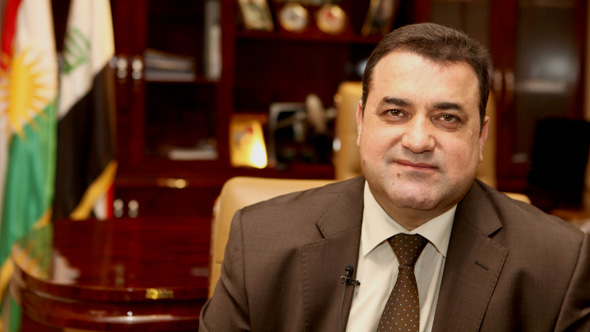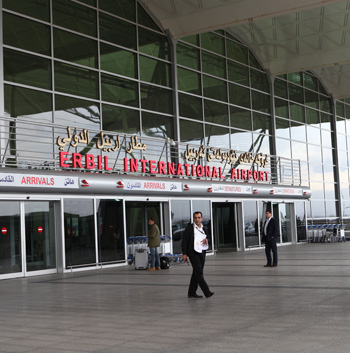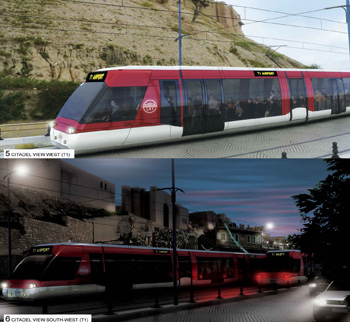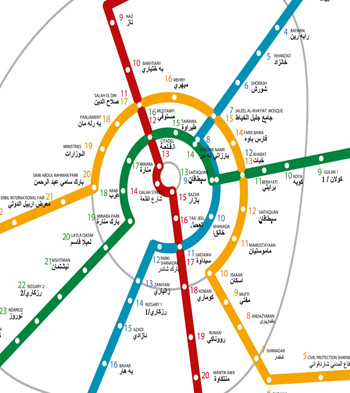Transportation and Communications Sector in Kurdistan: Projects and Plans
The Minister reveals his greatest worries and also plans in order to improve the state of infrastructure in the Kurdistan region of Iraq.

What are the responsibilities of the Ministry of Transportation and Communication?
The Ministry of Transportation and Communications is responsible for the sectors of local internal transportation. As for the communications sector, it covers internet along with local and international mobile services.
Regarding transportation, we start by numerating the types of transportation in the region, which starts with public transportation using cars or buses, and we have vehicles to transport goods internally and externally. As for how we monitor the sector, it must be known that the ministry acts by organizing the transportation sector through local companies working within this field. We have companies for goods transportation, other companies for public transportation inside the region, inside the cities of the region and from one city to another, and then from the region toward neighboring countries. This means that the ministry organizes the operations with and among companies from the public sector in order to monitor and control the transportation sector in Kurdistan region. That’s what we have just now, but as for the future, we might consider other ideas.
I admit that we face problems in our region when it comes to the transportation sector since the system being used to run the transportation sector is an old one, which needs a lot of development, especially concerning traffic jams inside the cities, which takes place from early morning hours to night time.  For this reason, we are considering the idea of having a tramway system inside Kurdistan region, a railway system among cities, and also a city bus in order to organize the flow of traffic within the region. We also initiated the implementation of a plan by which we encourage replacing the old buses by new ones. As for the companies chosen to provide new buses in order to replace the old ones (not for commercial use), they are to be exempted from taxes. Moreover, the ministry, as a government, will subsidize the driver or the owner of the old bus who wishes to switch to a new one paying them $ 3,000 for bringing comfort to travelers. In my opinion, this is a small amount of money, and we are trying to increase it in order to encourage the plan at hand. We are considering a bigger contribution, yet we are waiting for the approval from the cabinet in order to achieve success concerning the plan.
For this reason, we are considering the idea of having a tramway system inside Kurdistan region, a railway system among cities, and also a city bus in order to organize the flow of traffic within the region. We also initiated the implementation of a plan by which we encourage replacing the old buses by new ones. As for the companies chosen to provide new buses in order to replace the old ones (not for commercial use), they are to be exempted from taxes. Moreover, the ministry, as a government, will subsidize the driver or the owner of the old bus who wishes to switch to a new one paying them $ 3,000 for bringing comfort to travelers. In my opinion, this is a small amount of money, and we are trying to increase it in order to encourage the plan at hand. We are considering a bigger contribution, yet we are waiting for the approval from the cabinet in order to achieve success concerning the plan.
What are the biggest investment projects under consideration? How much employment are they going to generate? How much economic activity will they generate when it comes to GDP?
I had a meeting yesterday with the Iraqi Minister of Transportation. We discussed the idea of connecting the Iraqi railway system to Kurdistan region, heading out towards Turkey and other countries through it. Achieving this project means connecting Kurdistan region to the European countries through Turkey, along with connecting the other Iraqi cities to the region and giving us border passages to Turkey and Iran. Therefore, if this project becomes a reality in the future, it will generate many profits when it comes to transportation sector. It will also bring many revenues for the Kurdistan region’s GDP since it is a vital and strategic project that will bring many benefits to the public and goods transportation. This is especially important since Kurdistan region is far from sea and harbors, which means we have no other alternatives, making this project the vital and strategic alternative we need. Yet, one must know that the expenses are high and the project is a difficult one, and in order to achieve it we are seriously planning and working, knowing that our first step is through the Iraqi government, which is showing an interest in this strategic project that will benefit the whole of Iraq along with the Kurdistan region.
What are your plans in order to bring investments for this project? You certainly have many other big projects going on that also aim to develop the region. What is the strategy you are using to attract investments for such projects?
This project includes two stages. The first stage aims to connect the rest of the provinces in Iraq to Kurdistan, and this will take place through the Iraqi government, so coordination will occur with the Iraqi government in order to attract and invite the giant companies specialized in railways. The matter of investment will be settled with the Iraqi government in order to achieve this project. The second stage will be within the Kurdistan region, which aims to connect the provinces together. For example, connecting Kirkuk to Sulaymaniyah, Kirkuk to Erbil, Mosul to Erbil, and then Mosul to Duhok, then back to Erbil and from there to Sulaymaniyah; that will be the second stage.
… we are considering the idea of having a tramway system inside Kurdistan region, a railway system among cities, and also a city bus in order to organize the flow of traffic within the region.
So for every project there will be an announcement and invitation targeting the giant companies that operate in the railways industry to get the project done. Yet since the expenses for such project are huge, makes it impossible to be realized at this time. However, I am sure that we will work hard in the future to achieve this project that will serve as a solution to the big problems we are facing now.
How can international investors and foreign companies enter the reconstruction process in Kurdistan? What are your efforts to attract them? What are the plans for legislation for the BOT or PPP (Public Private Partnership) involving the transfer?
Firstly, about attracting foreign companies, it is good to know that this became much easier for us as a government of the Kurdistan region. Most of the countries, especially the European and western nations, along with the neighbouring countries, already have consulates in the region. This makes things easier because consulates enjoy strong ties with ministries and governments, playing the role of coordinators between the government and ministers from one side and the companies in respective countries on the other side. This is the first thing to keep in mind.
Secondly, the nature of the governing system found in the region encourages the private sector and foreign investment because we aim to have a huge development in our region. Thus, we are in need of such companies. For this reason, we encourage them to come and invest here as we give all kinds of facilitations including the removal of any routine procedures just to give the encouragement needed for these companies to invest in Kurdistan region.
Thirdly, and most important, the political and security status of Kurdistan is fully stable. We have no problems that might affect the mindset of an investor. Actually, we see that the coming investor to the region will not find any difference between the political and security situation found here and the one found in his own country. The political, security and even economic situation is stable. This is a very important point when thinking about attracting foreign companies and investors to Kurdistan.
When it comes to the Kurdistan region, we prefer that projects end up because of investments. Since the general political situation is difficult, the major projects with contracts involving long periods may be out of the question for investors. We are trying to think differently when it comes to loans for example. Yet until now, the region has not decided on the matter of loans and for us as a ministry, we do not want to end up doing projects in the form of long-term loans. Thus, we are thinking now that the only way to get the project done is through direct investments of companies. We already tried this concept on tramway and railway projects but this is not being accepted on a large scale. This means we did not find investing companies for these projects within the region.
Isn’t there any interest coming from western companies?
Let us take for example the projects of railway and tramway. We will see that the railway project will cost millions of U.S. dollars, so if they worked on the project based on investment system without any direct payments from the region, then this might lead to a contract with a timeline of twenty years until the deal is sealed. However, twenty years is a long time in an area with no political stability like that of the European countries; particularly with everything going on in the area like the change of ruling regimes in Egypt, Syria and other countries, along with the crisis in Iran. Therefore, the aftermath of such conflicts might affect the mindset of potential investors here. This is why we have not met any success on projects based on investments yet.
What about the tramway project?
Yes, we also have another project related to tramway in the three provinces: Erbil, Duhok and Sulaymaniyah. We already finished studying and designing the tramway project in Erbil, and we have already started the implementation phase. As for Duhok and Sulaymaniyah, the study and design may finish at the beginning of the coming year (2013). Until now, we have not decided on how to implement the project.We formed a committee with members from different specialized ministries, which will lead a series of meetings before submitting recommendations to the cabinet.So it will either be a direct implementation through stages, or we shall try to find companies that will handle this based on investments or BOT.  However, as a ministry we think that we will not succeed if we went by the investment and stages plan. We need to do this by direct implementation by the government. For example, if Erbil needs four lines, we can do a line or two each year based on the capabilities of the government. Therefore, the ministerial committee that we formed to handle this topic will make the decision, then it will submit its recommendations to the cabinet, and the final decision will be made there. This is everything related to the tramway project.
However, as a ministry we think that we will not succeed if we went by the investment and stages plan. We need to do this by direct implementation by the government. For example, if Erbil needs four lines, we can do a line or two each year based on the capabilities of the government. Therefore, the ministerial committee that we formed to handle this topic will make the decision, then it will submit its recommendations to the cabinet, and the final decision will be made there. This is everything related to the tramway project.
Now, we have another project which is the city bus. This project meets a lot of interest from foreign companies. Our ministry already formed a committee involves the ministry itself in addition to provinces, municipalities and unions; everyone agrees to get the city bus project done. Our only condition is that the company that will bring the new buses must hire employees, whether drivers or other service men, from the region. There are many companies that showed great interest in this project, but we haven’t come to a conclusion for this project yet. However, the committee will meet soon and issue a final decision before starting the implementation of the city bus project in Erbil. If we succeed, we will move on towards Duhok and Sulaymaniyah. We are sure that this will help solve the problems of people in an efficient way, because our problems will not be solved by using small cabs, and because our people need new well-organized and comfortable buses.
Furthermore, yesterday we had a meeting with the Ministry of Municipalities, and the Ministry of Transportation attended the meeting to talk about the topic of terminals in major or small cities. Those terminals will be used to transport goods and passengers. Now each terminal must be equipped with all the facilities of comfort for the benefit of travelers, just like in Europe and other developed countries. This could start with big garages, hotels, restaurants, cafeterias, gas stations, service shops along with everything needed to handle goods like freezers, storehouses and warehouses with high standards. We will start working on these terminals and let the private sector handle it. Our job, as a ministry, will be limited to provide appropriate real estates in accordance with the size of the target city, since major cities demand bigger territories than the minor ones. Regarding investment, it would be through the private sector, while the future implementation of the project will be done under the supervision of the ministry. This means that we will monitor the private sector while building the project.
Now what is more important than this is that we assigned the financial company with the task of declaring the economic benefit of the project along with estimating the expenses needed in order to have a Master plan for the transportation sector of the entire region. By now local government in the Kurdistan region (KRG) has no Master plan yet.
… the political and security status of Kurdistan is fully stable. We have no problems that might affect the mindset of an investor. Actually, we see that the coming investor to the region will not find any difference between the political and security situation found here and the one found in his own country. The political, security and even economic situation is stable. This is a very important point when thinking about attracting foreign companies and investors to Kurdistan.
We must know all the details. Let us take for example the projects of tramway and railway, or the city bus, which targets internal and external passengers’ transportation. We must know all the related details, like the total number of passengers per day, connecting bus terminals with tramway stations, maximizing passenger benefit from the systems of buses, tramway and railway, and connecting them while setting a traveling plan with the lowest fare. All these details will be clear with a Master plan, so when we think of a future project, we will find complete information for another five, ten or twenty years. This way, we will not end up with conflicts and problems and be able to solve current and future problems through the Master plan. However, until now, we have not received a green light from the cabinet, but we will push as much as possible to implement this and we shall spend all efforts since this is a very important project that will benefit the entire region.
What are the biggest problems that the Ministry of Transport and Communication face when it comes to implementing all these plans? When traveling outside, do you still face any misperceptions about Kurdistan as a problem or obstacle facing the region’s plans?
Actually, until now we have not traveled outside Iraq since the new cabinet was formed because we had lots of work to do when we started. We held many meetings and we were informed of new instructions regarding communication companies, so our meetings are still ongoing to issue new instructions for transportation and mailing sectors. These take a lot of time, yet we keep on meeting with envoys from foreign countries and communicating with various consulates and embassies, so they already have a clear idea on how things are in the Kurdistan region. In addition, I am sure that the different news networks that come here do proper coverage and submit correct news that are contrary to what was circulated before.
In my opinion, the only problem we have with these projects, the huge strategic ones, is the matter of costs and this is because of the current phase that the region is going through.
What is your plan to solve the financial problem?
These are huge projects, so the railway and the tramway projects are mainly relying on the approval of the Iraqi government, which has huge resources like oil. If the Iraqi government gives the green light for this project, then we will surely benefit from that. Another important point is that I am sure that by the end of 2013, things will be more stable; everything will change and will make the situation become normal again and the cash needed will be provided for implementing such huge projects.
So firstly, we are waiting for the green light from the Iraqi government since our main problems are with them, to be honest. Even if the region’s share goes up to 17%, which arrives either by settlements or late, they do not even pay the dues as they should. In addition, we have a few unsolved problems between us like the problem of the Peshmerga. This will impose a negative influence on the budget of Kurdistan, which is given to us by the Iraqi government. I am sure that these things will influence us when it comes to implementing projects.
Is there any other thing you would like to add concerning the Ministry of Transportation and Communications itself?
I want to emphasize that our ministry, which covers the sectors of transportation and communications, is an important ministry. It provides services to the citizens and addresses their daily problems within the region, whether inside the major or small cities and even inside their houses when it comes to internet or other communication issues which is tied directly to our responsibilities. We will try to benefit from the experience coming from foreign countries by consulting specialized companies from different countries to develop the sectors under the scope of our ministry. We will also seek the benefit coming from big companies who achieved greatly in Europe, and other developed countries like America or other neighboring nations. We have constant connections to increase the number of training programs of our staff by sending them to workshops in foreign countries, and we will have a program next year that will increase the number of educational and training programs for specialized staff in our ministry, inside or outside the country.
Talk to us briefly regarding communications, please.
As I mentioned earlier, the communications sector is an important one, especially with all the technical advancements found in this sector. We already started implementing the new system for internet services since the quality of the service in Kurdistan is not as good as it should be. We are trying to develop this sector with big plans that will not be set by us as a ministry, because our role is to organize the work of specialized public sector companies working in this field. What we have been missing, up to this point, is the factor of competition, which is one of the most important factors to develop this field. Thus, as a ministry, we shall solve that through a new set of instructions. However, we are waiting for the approval from the cabinet, and then we shall start the implementation, knowing that the competition will be fierce and new internet systems will be provided within the region. In addition, there are other kinds of projects that companies are trying to implement in the region. We shall encourage these companies and provide them everything needed to achieve these communication projects.
Are there many challenges when it comes to internet, like a very low penetration (access) rate compared to other Gulf countries?
Of course, we are facing some sort of problems with internet. As I mentioned earlier, we are not satisfied as a ministry with the internet services provided by the companies. We are working to develop this sector to bring progress to it in terms of how these companies operate along with the higher quality of services provided. By next year, you will witness a great change due to the developments happening in the area. We also have the issue of aerial antennas. We already started connecting all the stations found in all provinces covering all the plain and mountain areas to one station through internet, which enabled us to receive detailed information every ten minutes from all areas regarding the weather conditions, temperature, pressure, humidity and rain. There is a new project that we will start in a matter of days, in which we will invite selected foreign companies to build a weather forecasting and seismic (earthquake) monitoring station. This will be connected with an uplink to satellites, and will be used to forecast the weather conditions days ahead, just like in many other countries in the world. Remember that we have an area with a history of earthquakes (Sulaymaniyah) so a station like this will help us detect the signs of an earthquake before it takes place, and thus have detailed information about it. This project will start soon and will be finished by next year.